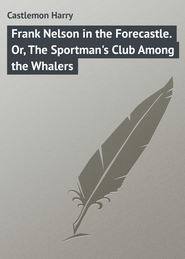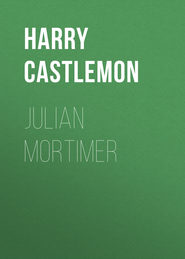По всем вопросам обращайтесь на: info@litportal.ru
(©) 2003-2025.
✖
The Haunted Mine
Настройки чтения
Размер шрифта
Высота строк
Поля
A PLAN THAT DIDN'T WORK
Julian Gray took his stand in one corner of the room, with his hands in his pockets and his feet spread out, and looked at this man who called himself Haberstro. He was a German, there were no two ways about that; and he had a habit of taking out his handkerchief and wiping his face with it that nobody but a pompous and well-to-do German ever imitated.
"Do you know of a man of the name of Winkleman?" asked Jack.
"Know him?" exclaimed the German. "Of course I do. He was living here in St. Louis with me, but all on a sudden he took the gold fever and went out to Denver. I was engaged in pretty good business, and so I did not go with him. I never heard what he was doing out there. He – he isn't dead, is he?"
"Oh, no. He accumulated some property while he was out there. He got a notice that his father had died in Europe and left all his property to him, and he has gone home to take possession of it."
"Then that accounts for his not writing to me. He always said that his folks were immensely rich, and that some day he would have more than he wanted. What property did he collect out there?"
"He is worth several buildings which are worth a hundred thousand dollars. Furthermore, he has given them to you."
"To me?" cried the German, rising to his feet.
"Yes, to you. And, more than that, he has a mine out of which he took fifty thousand dollars, and you come into possession of that, also."
"Lord bless my soul!" exclaimed the German. "I don't remember that I ever did anything to him to give him so good an opinion of me."
"Did you not nurse him while he was sick?"
"Did you not care for your mother when she was sick?" returned the German. "Of course that did not amount to anything. He was my chum, and I had to stand by him."
"Well, he gave you the property for it, anyway. He sent you the deeds by express, and Julian bought them for thirty cents."
"Well, sir, that is a heap of money. I don't know anybody that needs it more than I do. Where is the box now?"
"It is safe in the hands of Mr. Wiggins. We were not going to have somebody come along here and claim to be Haberstro. Have you anybody here in St. Louis to whom you can recommend us? We want to know who you are before we give up the box."
"That is perfectly right and proper. You see, my home is in Chicago, and I know but few persons here. If you think this Mr – what do you call him?"
"Wiggins?" said Jack.
"Yes; if you think he will want somebody to vouch for me, I can give him the names of all the Germans in the city. Where does he hang out?"
"The Union Telegraph office. You know where that is?"
"I can easily find it, for I have a tongue in my head. I don't believe I will go near that mine at all. I will sell it."
"You had better not. The miners have a story around that it is haunted."
The German threw back his head and laughed heartily.
"I am not afraid of that. If he took fifty thousand dollars out of it, it is surely worth as much more. Well, if you have told me everything, I guess I had better go back to my hotel. I was going back to my home to-night, but now I am glad I did not go."
"I guess we have told you everything that pertains to the matter," said Jack. "Do you think of any questions you would like to ask us?"
"No; but I may think of some to-morrow. Good-night."
"By the way," said Jack, as if he had just thought of something. "Where were you when this man Winkleman was sick? You were out in the mines, I suppose?"
"Oh, no, we were not; we were here in St. Louis. If we had been out at the mines, where no doctor could have been reached, he would have gone up on my hands. Look here – I don't want you to do this for nothing. Make up your minds what you ought to have and I will give it to you. If it had not been for you I would never have seen the box. Good-night."
The German bowed himself out and closed the door behind him. The boys waited until he got to the street, and then Julian took possession of the chair he had just vacated.
"Well, sir, what do you think of that?" asked Jack, using companion's expression.
"I think our fortune is gone up," answered Julian; and then he leaned his elbows on his knees and looked down at the floor.
Jack laughed as loudly as the German did a few moments before. Julian straightened up and looked at him in surprise.
"What do you mean by that?" he exclaimed. "Is a hundred thousand dollars such a sum in your eyes that you can afford to be merry over it?"
"No; but you will never lose it through that man. His name is not Haberstro any more than mine is."
"Jack, what do you mean?"
"You were so busy with your own thoughts that you didn't see how I was pumping him, did you? In the first place he told us that Winkleman was sick in St. Louis; and yet Winkleman says in his letter that they were so poor that they could not raise enough to buy a halter for a mule. Now, he would not have used such an expression as that if he had been here in the city, would he?"
"No, I don't think he would," said Julian, reflectively. "He used the words of the country in which he lived."
"That is what I think. In the next place, he said that he was engaged in a paying business here, and consequently did not go with Winkleman to the mines; and then, almost in the same breath, he said he could not refer me to anybody here because his home was in Chicago. You didn't see those little errors, did you?"
Julian began to brighten up. He remembered all the German had said to Jack, but somehow he did not think of it. The box was not lost, after all.
"Now, he must have had somebody to post him in regard to these matters," said Jack. "Who do you think it was?"
"Casper Nevins!" said Julian, who just then happened to think of the boy's name.
"That is what I think. He is bound to have that box, is he not? Don't you give that box up; do you hear me?"
"I am mighty sure I won't give it up," said Julian, emphatically. "I shan't give it up until you are on hand. I had better take Mr. Wiggins into my confidence to-morrow."
"Of course. Tell him the whole thing. Tell him about the mistakes this man made in his conversation with me, and let him draw his own conclusions. I never saw such a desperate fellow as that Casper Nevins is. Now let us go on and get supper."
"I feel a good deal better than I did a few minutes ago," said Julian, with something like a long-drawn sigh of relief. "I thought the box was lost to us, sure."
The boys were impatient to have to-morrow come because they wanted to see what the German – they did not know what his true name was – was going to do about it.
"I will tell you one thing, Jack," said Julian. "If that Dutchman goes to-morrow and sees Mr. Wiggins about it, he will get a look that will last him as long as he lives. I ought to know, for I have had those eyes turned on me two or three times. If that man stands against them I shall think he is a nervy fellow."
The night wore away at last, and at the usual hour the boys were at their posts. Casper was in the office, and he seemed to be uneasy about something. He could not sit still. He was continually getting up and going to the door, and then he would come back and walk around the room. When Mr. Wiggins came in and wished them all a good-morning, Julian followed him into the back room.
"Julian, have you some news about that box?" said he.
"Yes, sir; there was a man up to our room and handed us this card, and I thought – "
"Halloo," said Mr. Wiggins. "The box does not belong to you, after all."











